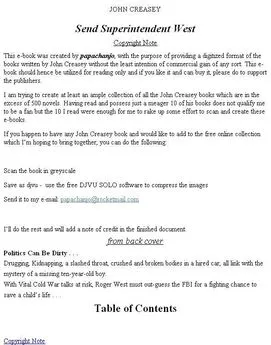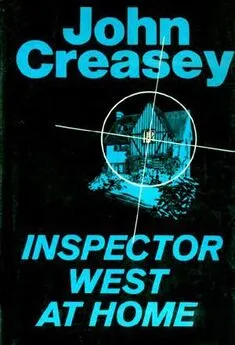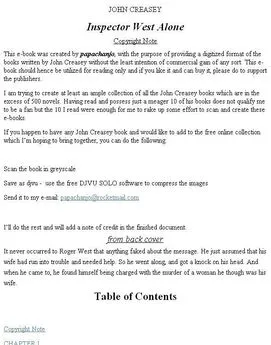John Creasey - Send Superintendent West
- Название:Send Superintendent West
- Автор:
- Жанр:
- Издательство:неизвестно
- Год:неизвестен
- ISBN:нет данных
- Рейтинг:
- Избранное:Добавить в избранное
-
Отзывы:
-
Ваша оценка:
John Creasey - Send Superintendent West краткое содержание
Send Superintendent West - читать онлайн бесплатно полную версию (весь текст целиком)
Интервал:
Закладка:
Gradually, the door opened; and in the greyness of the morning a woman appeared. He could see her hair, the silhouette of her robe against a light beyond.
It was Lissa.
She stood for a moment looking at him, and he breathed evenly; she was listening for that. Then she came forward, without closing the door. Her right hand was stretched out, and he tried to see whether she had anything in it, but could not. She drew nearer, and her robe rustled, but otherwise she made no sound. Now she was only a foot or two from the bed, and he could see that her hand was empty. The light was good enough to show the softness of her beauty; and the robe seemed like a silken Sheath. His heart was thumping with a fierce longing which he wouldn’t face. She leaned forward, as if to make sure that he was asleep, and then, quickly, she bent towards him. He moved convulsively. Her lips touched his, pressed hard against them, and he became still.
She drew back, breathing heavily, more agitated than he had ever known her. Then she said softly:
“Roger.”
He grunted, as if he had been asleep and the movement had been unconscious.
“Roger,” she said more loudly. Wake up.” Her hand moved to the bedside lamp, and she switched it on. The brightness lit against his eyes, and he screwed them up. “I’m sorry, Roger, but you must wake up.”
“Who’s that?” he muttered.
“It’s Lissa.”
“Lissa? What —” He didn’t try to finish, but struggled up on his pillows. “What is it?”
“There’s been a message,” she said quietly. “Marino thinks he knows where Gissing and Ricky are. You’re to fly down to Trenton, New Jersey. I hated waking you.” She had easily won the brief fight against her emotional agitation. “You sleep like a child.”
He said gruffly: “But I’m not a child. Give me ten minutes.”
“I’ll have some coffee ready,” Lissa promised.
“Fine.” He smiled, rasped a hand over his stubble, waited until she had closed the door, and then pressed his fingers against his lips.
“You bloody fool,” he said savagely. “You damned fool.” He made himself picture Janet, at the house, as she had been when Lissa’s cable arrived. “You bloody fool!” he muttered, and began to fling on his clothes. He pushed borrowed shaving-gear and oddments into a borrowed bag, and was ready when Lissa tapped at the door. “Come in.”
She carried a tray. She hadn’t dressed, looked as bright and fresh as he had always known her, but was crisp and businesslike. There were rolls and butter, jelly and marmalade, as well as coffee.
“No one else is awake,” she said. “I’ll be back in five minutes, and I’ll drive you to the airfield. The plane’s waiting.” She went out without looking at him.
In six or seven minutes she was back, wearing the same beige shirt and wine red skirt as yesterday, with a short-waisted lumber-jacket type coat slung over her shoulders. She drank the cup of coffee he poured for her, and they hurried downstairs. They were at the front door, when a man called out sharply:
“Who’s that?”
Lissa cried: “Be quiet!”
It was Fischer, still in his dressing-gown, hair tousled, eyes bleary in the landing light. He was already halfway down the stairs.
“What the hell’s all this?”
“Roger’s been recalled,” Lissa said.
“ Recalled. ”
“It’s the very devil,” Roger said. His cue was ready made, because Lissa was determined Fischer shouldn’t be sure of the truth. And couldn’t Fischer have doped that milk, as easily as Lissa? “See you one day.” He waved, and opened the door.
Fischer was muttering something, and still coming down. He was at the open door when they drove out from the garage. He waved.
“Can our man be Carl?” Lissa asked.
“It can be anyone, male or female.”
She laughed, but did not sound carefree. She drove much faster than she had the previous day, and the waking country-side slipped by. They passed through a township with the needle at sixty. The airfield was on the far side, and he heard the engines of a “plane warming up. It was a twin-engined machine with sleek lines. The pilot and one other member of the crew were waiting.
Roger turned to Lissa. “Be careful,” he said. “You —”
“I’m coming with you,” she interrupted. “I’ve a grip with some clothes in the boot I had to fool Carl.”
• • •
Greeting the pilot and his second-in-command, climbing into the aircraft behind Lissa, looking out of the window at the green fields, the stretch of tarmac and the small aerodrome buildings all seemed to crowd in on Roger. He had hardly sat down before they started to move. There were twenty-two seats, but they were the only passengers.
He sensed the smoothness of the “plane as it was airborne. It circled once, and he saw the building again. Lissa was by his side, leaning back relaxed.
But as the machine climbed, and Roger also relaxed back in his seat, a darting thought drove relaxation away.
He knew that Lissa could have doped the Shawns; knew too that she could have betrayed him, Roger, before, although he didn’t think so, hated to think so. Could she have hired this plane and hired the pilot?
22
THE WHEELCHAIR
“WE’RE nearly there,” Lissa said. “There’s Trenton.” She pointed to a huddle of houses thousands of feet below, a township set amid green countryside, rolling and pleasant. Even up here, they could see the winding ribbons of roads and, not far away, a road wider and straighter than the others. “I wonder if they’re right, and they’ve found Gissing.”
“We’ll see,” said Roger, and forced out the question which he had locked in for the past hour and a half. “Why did you come the way you did? ”
“I knew Carl was up, there was a light under his door when I left your room. I thought if he saw me about in a robe, he would assume that I wasn’t leaving. But naturally he had to see me fully dressed. If he’s involved, he will have found a way of warning Gissing. I suppose I could, too.”
Roger shrugged. “Everyone but Ed Pullinger. It might have been better to stay behind. Carl wouldn’t have been suspicious of me leaving on my own.”
“I had to come,” Lissa said.
“Orders?”
Her eyes laughed at him. “Yes, and not mine.”
They were circling to land, and Roger could pick out the small airfield and the little ant-like figures of men waiting for them. He still didn’t feel sure of anything, but was less uneasy than he had been. The landing came, as always, before he expected it They taxied towards the airport buildings, past them slowly once, and then turned back again. He felt Lissa become tense. They turned again and taxied back, and Lissa said softy:
“There he is.”
“Who?”
Roger peered out of the little window, and needed no answer. A man sat in a wheelchair outside the doors of the building. He wasn’t smiling. He had a big face, and even from here his chin and jowl seemed dark. He was hatless, and his hair looked black as soot.
Marino had come home.
Marino’s hand-clasp had the warmth of old, tried friendship. He smiled at Roger, then put both hands out to Lissa, who bent down and kissed him on the forehead. He chuckled as he began to turn the wheels of his chair. Roger and Lissa walked, one on either side of him, across the grass towards the cars which were waiting on the road leading to the town.
“I need more of that treatment,” Marino said. “Have you two made it up?”
“Who’s quarrelled?” asked Roger.
Marino’s manner had a touch of boyishness which was good to see, which hid excitement and expectation; he seemed more than ever sure of himself.
“Didn’t she quarrel with you, Detective?”
Roger looked over his head at a demure Lissa.
“Lissa reported it to Washington, I picked up a message,” went on Marino. “It wasn’t a laugh, either, Lissa had been pointed out as a suspect by others, but we always come down on her side. Carl Fischer — it would surprise me if he were anti-American, but I’ve been surprised before. Ed Pullinger? He was at the swimming-pool when Ricky dropped that identity tag. We can work on that later. Sure you’ll recognize Gissing again, Roger?”
Roger said: “If I had to forget you or Gissing, I would forget you. Where is he?”
“We think he’s at a farm fifteen miles from here,” replied Marino. “He answers your description. He was seen in a car early last night. There were two cars, the same make as two of the cars which left Webster’s old house, and in the first there was a boy passenger, who seemed to be asleep. A traffic cop noticed them. He was directing traffic past an accident, they had to slow down, and he had a good look. So we checked. Several other people noticed the two cars, and three described Gissing well enough to make us hope. So we got into the garage during the night and scraped some of the dirt from under the guards. It’s Adirondacks dirt, of a kind you don’t find in New Jersey. There was a copy of the Wycoma Standard in the glove compartment, too, so the cars came from that neck of the wood. A man who could be Gissing, a sleeping boy and this evidence, isn’t conclusive, but why shouldn’t we hope?”
“Don’t ask me,” Lissa said. “Why did you come yourself, Tony?”
“I was recalled. I have to talk David into going back to England.”
No one spoke.
Marino was helped into a big pre-war Lincoln, next to the driver, with Roger and Lissa at the back.
“We’re going to a restaurant two miles away from the farm,” Marino said, “and from there we’re going to raid the house. It will catch them with their pants down. The farm’s surrounded, and anyone who leaves is picked up when he’s too far away to be noticed by anybody still at the farmhouse. It can’t go wrong.”
He meant: “It mustn’t go wrong.”
“And when you’ve caught Gissing and found the boy, I just put a finger on Gissing,” Roger said.
“That’s right.”
“Don’t you like the plan?” Lissa picked out the doubt in his voice.
“I don’t like it at all,” Roger said bluntly.
How would you do it?” Marino asked, turning his head with difficulty.
“I could identify him first, you could catch him afterwards.”
“You would go up to the house on your own?”
“And have a better opportunity to get in. If he has time, he might kill that boy.” Roger’s tone was light, but neither of the others needed telling what he was thinking. “Let’s give the boy a chance.”
“How would he think you’d found him on your own?” Marino asked dryly. “We’ll do it our way.”
“It’s the wrong way.”
Marino sighed. “These stubborn Britishers.”
“Oh, I know, I’ve been wrong all along,” Roger said heavily. “If Fischer’s the spy, Gissing will know that I’m on the way somewhere. Lissa tried hard, but Fischer wouldn’t so easily be convinced that I was recalled to London. Even if Fischer didn’t, someone else might have warned Gissing, and the chances are he will be ready for you when you arrive. You know all this as well as I do.”
“If Gissing’s had a warning, he would be ready for us and ready for you. And if you went alone, he would know we weren’t far behind,” Marino argued.
“Are we getting any place?” asked Lissa.
“We will do it my way,” said Marino. “Sorry, Roger, but that’s how it is.”
They drove on, the chauffeur apparently oblivious. Roger sat at the back, staring at Marino’s head, knowing nothing would move the man yet feeling sure that to raid the house as Marino planned offered risks that could be avoided. The truth was simple: Marino was sure that he had Gissing surrounded, thought that when Gissing knew the game was up, he would submit without a fight. He didn’t know Gissing.
Читать дальшеИнтервал:
Закладка:










